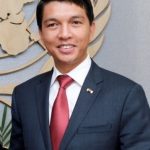Politics
Madagascar Politics
This page explores Madagascar’s political structure incorporating real-time RSS feed news and videos. By harnessing the power of RSS feeds, visitors can stay informed about the latest developments in Madagascar’s politics as they happen. The dynamic nature of these feeds ensures that users receive up-to-the-minute updates on political events, policy changes, and significant milestones, enabling them to stay abreast of the ever-evolving political scene.

Andry Rajoelina
7th President of Madagascar
Incumbent
Assumed office
19 January 2019
Image credit
Madagascar operates as a semi-presidential republic, with a political structure that combines elements of both presidential and parliamentary systems. The political landscape of Madagascar is shaped by a multi-party system and a separation of powers among the executive, legislative, and judicial branches.
At the top of the political structure is the President of Madagascar, who serves as the head of state and government. The President is elected by popular vote for a five-year term and holds significant executive powers. The President appoints the Prime Minister, who is the head of government and oversees the day-to-day administration.
The legislative branch in Madagascar is represented by the bicameral Parliament, which consists of the National Assembly and the Senate. The National Assembly is the lower house and comprises members elected through a mixed-member proportional representation system. The Senate is the upper house and includes members elected by regional and local councils, as well as appointed members. The Parliament is responsible for making laws, approving the national budget, and exercising legislative oversight.
The judiciary in Madagascar is independent and ensures the interpretation and application of the law. The Supreme Court is the highest judicial authority, responsible for constitutional matters and ensuring the legality of laws. Lower courts, such as appellate courts and district courts, handle various legal cases and provide access to justice.
Political parties in Madagascar play a significant role in the political landscape, with elections being an important aspect of the democratic process. However, the country has faced challenges in terms of political stability, governance, and the rule of law. Efforts are ongoing to strengthen democratic institutions, promote transparency, and address social and economic development.
In conclusion, Madagascar’s political structure is characterized by a semi-presidential republic, with a separation of powers among the executive, legislative, and judicial branches. The President holds executive authority, while the Parliament enacts laws and provides oversight. The judiciary operates independently to uphold the rule of law. Madagascar’s political system aims to foster democratic governance and ensure the protection of individual rights and freedoms.
Unless other sources are listed, original content is provided by ChatGPT. ChatGPT may produce inaccurate information about people, places, or facts.



